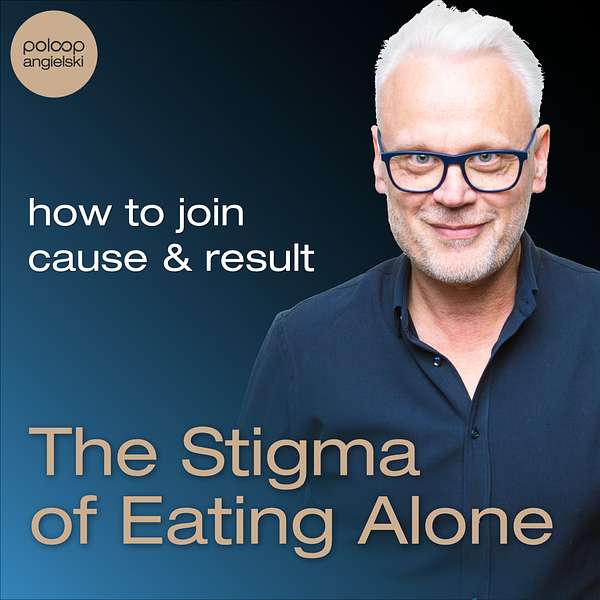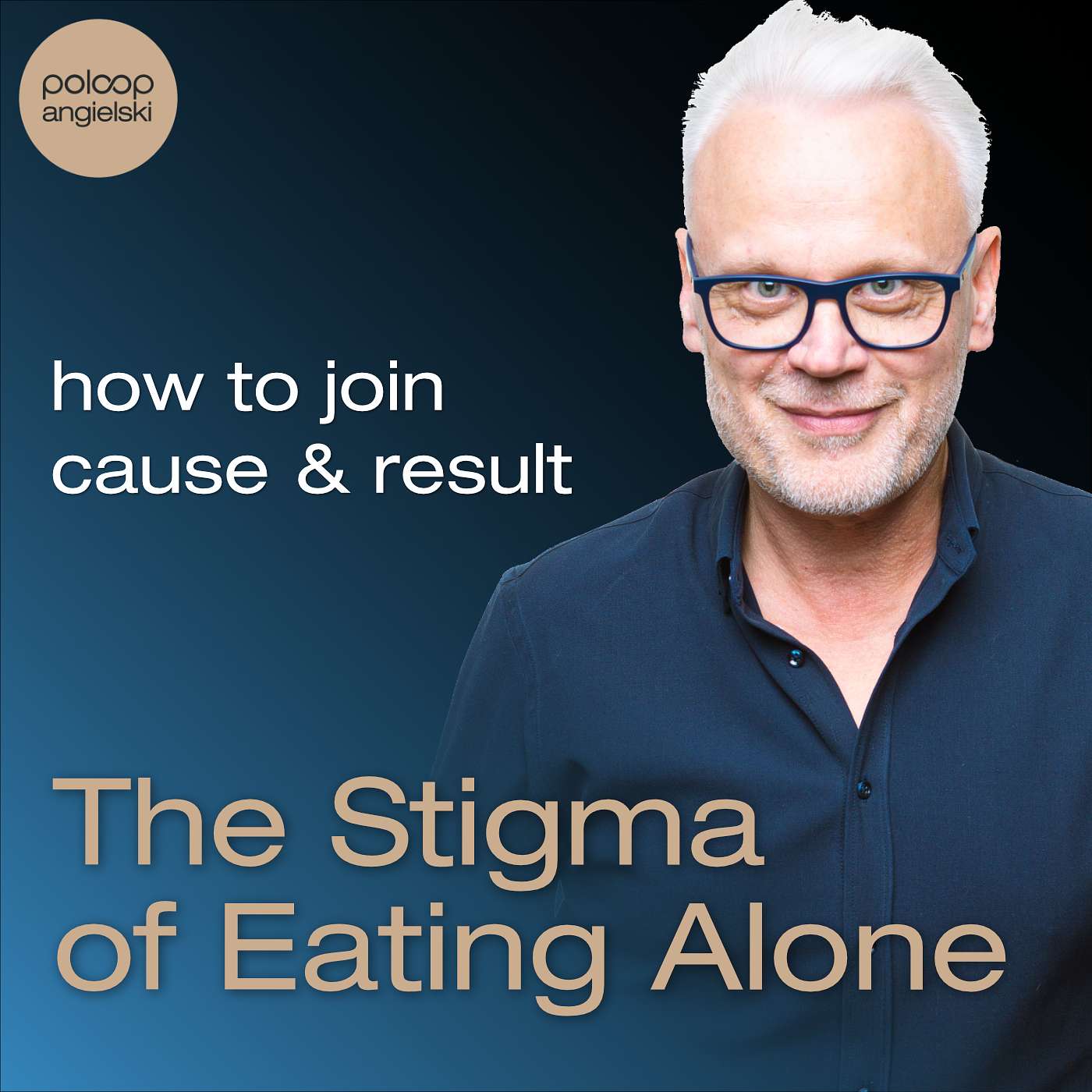
PoLoop Angielski
PoLoop Angielski
Episode 31: The Stigma of Eating Alone
In this episode, Jacek explores the topic of dining alone and its associated stigma. He begins by sharing statistics that reveal how dining alone has become more popular in the UK. Then he retells an anecdote about British comedian Jack Whitehall, who experienced an embarrassing situation while eating on his own in America.
Then you will hear the explanation of how the phrase "as such" could indicate a consequence or logical conclusion of something that has been mentioned earlier. Also, the episode provides listeners with examples of sentences in which other words and phrases convey the idea of cause and result in both written and spoken English.
Link to episode transcript.
Link to the article published in the Spectator on 18 March 2023 - The Art of Eating Alone.
Link to the Youtube clip with Jack Whitehall telling the anecdote retold in the episode.
For more, visit: PoLoop Angielski Blog
Drop me a line: jacek@poloopangielski.pl
And join us on social media: Instagram and Facebook
Would you like me to help you master your English? You can find out more about my courses here.
0:01
Hello, I'm Jacek Olender and this is PoLoop Angielski Podcast. For more materials for learners of English and the transcript of this episode, go to my website, poloopangielski.pl.
0:18
Did you know that in 2019, almost a third of British adults, ate alone most, or all of the time. Well, if you think it was because of the social distancing regulations during the pandemic, let me remind you that restaurants in the UK were not forced to introduce any restrictions due to COVID 19 until the end of that year. Also, the latest figures from OpenTable, a booking platform, show a 160% increase in booking for one, over the last four years. So definitely, dining alone is on the rise. I found these facts in the article, "The Art of Eating Alone", in this week's edition of The Spectator. It reminded me of an anecdote I heard about the stigma of eating alone. Stigma, by the way, is a negative attitude that people have about a certain type of behaviour.
1:26
This anecdote was told by Jack Whitehall, a British comedian, during one of his appearances on Graham Norton Show. I don't know if you know this show. It's a BBC talk show, featuring top world celebrities. So Jack shared the story about an embarrassing situation that he had while dining alone in America. Generally, he doesn't mind eating alone. But he doesn't want everyone around to know that he's having dinner solo. And once while he was in the US, he arrived at the restaurant, and there were no free tables, so he put his name down for one. He didn't have to wait long because the hostess came out within five minutes, and said in a loud voice, "Jack Whitehall party for one." Everyone in the restaurant looked over to see the pity party for one. Jack felt embarrassed and had to do a walk of shame to the back of the restaurant where he was seated. When he finally sat down, the hostess made a big fuss of removing additional covers, you know, plates, forks, knives and glasses, as if to make it absolutely clear to everyone that no one would sit opposite the poor soul. If that was not enough, the server returned with a menu, and, pointing to the section in it, said, "Well, you're not going to be interested in this first page because this is all our sharing plates". Jack understood that she was implying he had no friends to share food with. The next insult came when she brought him the wine list and drew his attention away from the list of wines offered by bottles, saying, "This is more of your area here, wines by the glass." That was the final straw that broke the camel's back, as they say, Jack could not put up with those insults any longer. He turned to the waitress and said, "Oh, madam, how wrong you are. I'm British. I may eat for a party of one, but I drink for a party of five." I don't know about you, but I feel sympathy for Jack. Especially because, just like him, I don't mind eating on my own. It's important to draw a distinction, that is, to see a difference between loneliness and comfortable solitude. The former one, feeling lonely, is a sad and difficult experience. While the latter, comfortable solitude, is a pleasant experience of enjoying your own company and finding peace and relaxation.
4:38
Actually, there is another reason why I bring up this article from The Spectator in today's episode. It's because of the phrase "as such", and how it is used in it to combine two sentences. So maybe I will quote: "Sharing a meal and drinks with others is an enjoyable thing to do, so people do it. As such, eating alone, has long held a kind of stigma." End of quote. So, the author here suggests that people enjoy eating and drinking together in social settings, sharing meals at a restaurant, or having drinks at the bar. So doing it alone has been viewed negatively by some people. Some people have attached a stigma to it. The phrase "as such" is used here to refer back to something that has just been mentioned, to indicate that what follows is a consequence or logical conclusion of that thing. The joy of sharing a meal and drinks with others, explains why eating alone has a stigma attached to it. The implication is that, if eating alone were equally enjoyable or common, there wouldn't be a stigma attached to it. So sharing a meal and drinks with others is an enjoyable thing to do, so people do it. As such, eating alone has long held a kind of stigma.
6:24
The phrase "as such" can be used in spoken English, although it is more commonly used in written English or formal context. There are several other phrases or words that can be used instead of "as such" to convey the same idea of cause and result, all of them actually more common, so I thought it might be a good idea to go through some examples of how they are used. And I will start with the most common and colloquial, and we'll end with the most formal and advanced phrases. So let's start. The most common word to connect a cause and result will be the word "so". "The concert has been sold out for weeks, so we won't be able to get tickets." Thet cause: the concert has been sold out for weeks. The consequence: we want to be able to get tickets. The next one, very popular phrase - "because of this". The traffic is always heavy during rush hour. Because of this, we should leave early to avoid being late. The cause: the traffic is heavy during rush hour. The consequence: we should leave early to avoid being late. The next phrase, actually a word, is "therefore". He's only 17. Therefore, he's not eligible to vote. The cause: he's only 17. The consequence: he can't vote. "Consequently". "The factory will be shut down for repairs. Consequently, there will be delays in production." The cause: the factory will be shut down for repairs. The consequence: delays in production. The next one is a very short word - "thus". "The company has experienced record profits this year. Thus, shareholders can expect a higher dividend payout." The cause: a record profits this year. The consequence: a higher dividend payout. Let's move to the word "hence". "The report shows a clear need for additional funding. Hence, we will be seeking new sources of financing." The cause: a clear need for additional funding. The consequence: we will be looking for new sources of financing. "Accordingly". "The team has been working hard and has met all of its targets. Accordingly, they will receive a bonus this quarter." The cause: their team's good results. The consequence: a bonus. Now, the expression "given this". "The weather forecast says it will rain all week. Given this, we should reschedule the outdoor event." The cause: it will rain all week. The consequence: we should reschedule the event. And the last one "in light of this". "The budget for the project has been reduced. In light of this, we will need to prioritise our spending carefully." The cause: the budget has been reduced. The consequence: we will need to prioritise our spending carefully. All of these words and phrases are used to indicate a cause-result relationship between two ideas. They signal that the second sentence is a logical consequence of the previous one. The choice of which word or phrase to use depends on the context and the style of communication.
10:14
I think I've given you enough alternatives to a simple "so" or to a more advanced "as such". So you can combine the cause with results comfortably. As such, I think I can say goodbye. And if you are listening to this while eating on your own, let me tell you, it was a pleasure to accompany you. Thank you. I'll speak to you next week. Bye.
Transcribed by https://otter.ai






